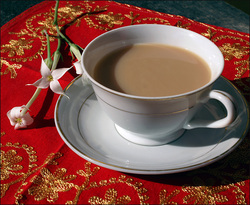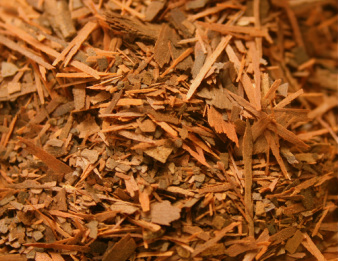Super Chai Tea


I’d like to encourage you to try this recipe, and also to modify it for yourself! Perhaps you enjoy black pepper more than me, or want a little less cinnamon. Maybe you don’t have astragalus root. This is OK! This particular recipe is, for me, quite delicious, but really what we are going for is a balanced tea. Warming but not too drying, not too spicy and not too sweet, aromatic and grounding at the same time. The most important thing is that it tastes good to you!

Adaptogens are herbs that increase resilience to stress of all kinds – chemical, environmental, emotional, and physical. They tend to boost the immune system and be very high in anti-oxidants. I try to ingest adaptogens on a regular basis, so they are in many of the tea blends that I drink regularly. However, unlike the aromatic chai spices, many of the adaptogens I use are roots and bark which must be decocted for a long time in order to extract the medicinal properties. Because this process can take a while, I like to make this tea in large batches.
Eleuthero root – Eleutherococcus senticosus, also known as Siberian ginseng, is a wonderful adaptogen with a mild, earthy taste. This herb is especially useful for increasing physical endurance and emotional resilience.
Astragalus root – Astragalus membranaceus. Astragalus is known for its deep support of the immune system. I like to take this throughout the winter to avoid colds, in the spring for allergies, and in the summer to protect myself from Lyme’s disease. Plus, Astragalus has a sweet, rooty taste. See my post on Astragalus here.
Pau d’arco bark – tabebuia impetiginosa.While it is not technically an adaptogen,Pau D’arco is one of my favorite herbs for its wide range of useful actions. It is immune boosting, anti-viral, anti-fungal, and anti-microbial. Plus it has a delicious taste! Read more about Pau D’arco here.
Medicinal Mushrooms - sometimes I like to add medicinal mushrooms such as Reishi, Turkey Tail, or Chaga to my chai! When i do this, i soak the mushrooms in cold water for an hour, and then make sure to increase the total simmer time to 3 hours to get the most out of my mushrooms! A little goes a long way, so you don't need as much mushroom. I would do 1 TBSP.
Chai spices are warming and aid in digestion, assimilation, circulation, and elimination! A perfect post-meal drink.
- 1-2 cinnamon sticks
- 5 cardamom pods, crushed
- ½ TBS fennel seed
- 2-3 black peppercorns
- 4 tsp grated fresh ginger, or ½ tsp dried ginger
- 1 whole star anise
- 4 cloves
- To make the base: I put a total of 1 ounce by weight of the adaptogen blend into a half gallon of water and simmer for a minimum of 1 hour.
- After 1 hour add the Chai spices and 1 cup of coconut milk.
- Allow to simmer for 5 minutes, then turn off the burner and let steep for 30 minutes or until desired spiciness has been reached.
- Strain, add honey to taste and enjoy!


 RSS Feed
RSS Feed
